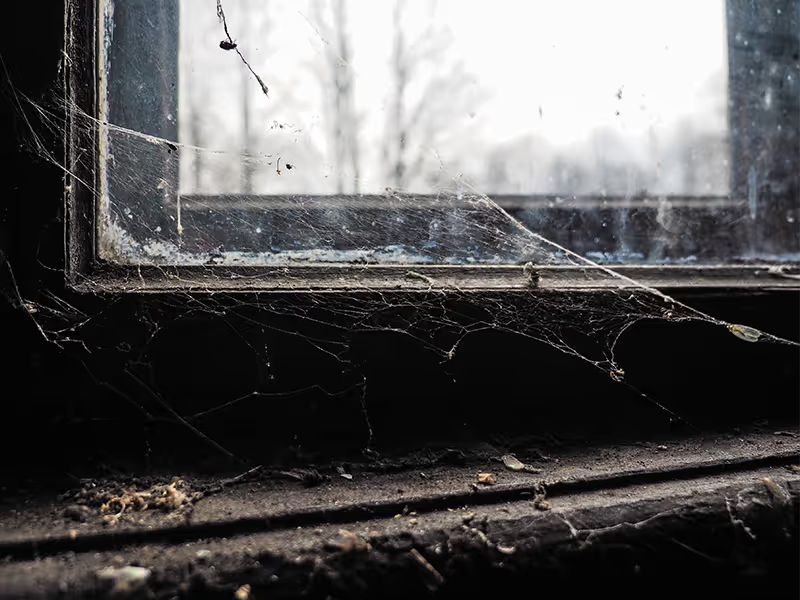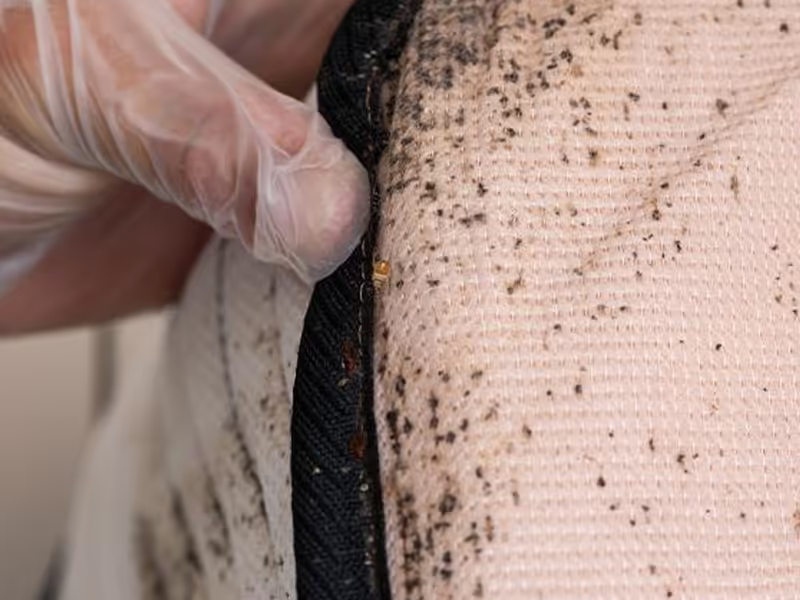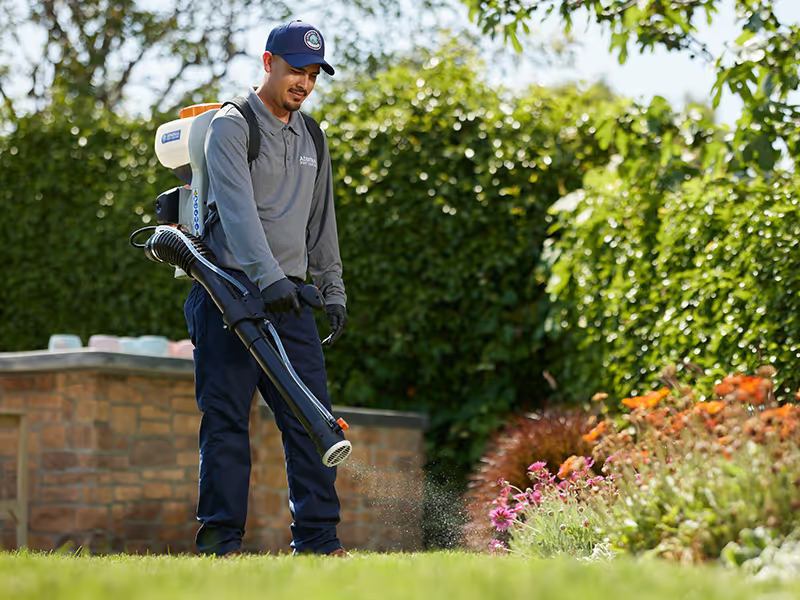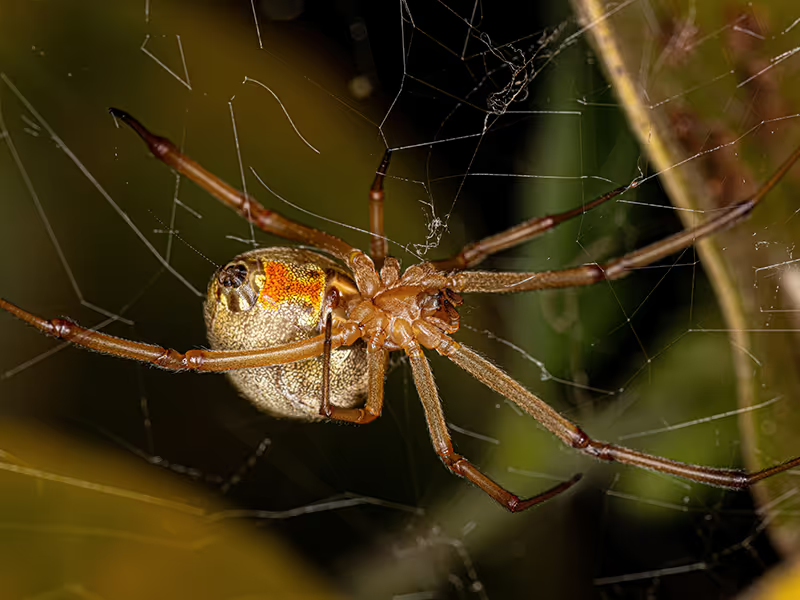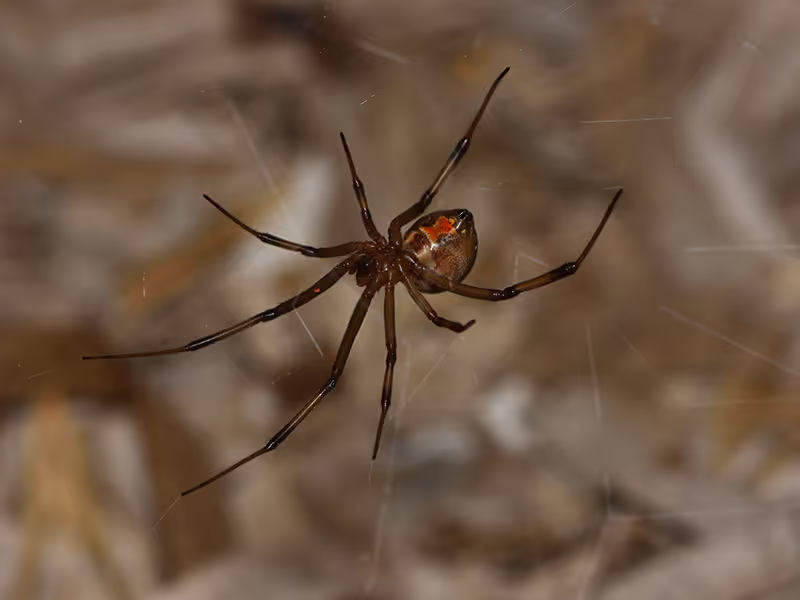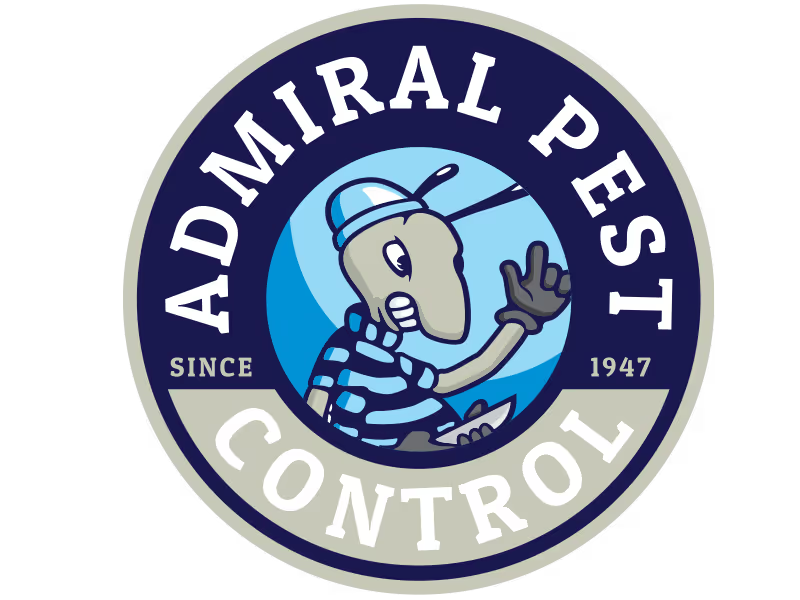Common Spiders in Irvine Homes
When it comes to spiders in Irvine homes, there are a few regulars you’re likely to see:
Common House Spider
The common house spider, also known as the domestic house spider, is one of the most frequent eight-legged visitors in Irvine homes1. These spiders are usually brownish in color and have a round body. They’re not dangerous to humans and actually help by eating other insects in your home. Common house spiders like to build their webs in corners, especially near windows and ceilings1. If you see a funnel-shaped web with a hole in the center, it’s probably made by a common house spider. Don’t worry if you disturb their web – these spiders aren’t aggressive and will usually just run away.
American House Spider
Common house spider - Achaearanea tepidariorum in front of a white background
Another frequent visitor is the American house spider1. These spiders are similar to the common house spider but have a unique way of building their webs. If you see a messy, tangled web that looks like Halloween decorations, it’s likely made by an American house spider1.American house spiders prefer to live in attics, basements, and near windows. Like their common house spider cousins, they’re not aggressive and won’t bother you unless they feel threatened.
Cellar Spider
Cellar spiders, sometimes called daddy long-legs (though that name is also used for other creatures), are common in Irvine homes5. They have small, pale bodies and very long, thin legs. As their name suggests, they like dark, quiet places like cellars, but you might also find them in other secluded spots around your house.
Poisonous Spiders in Irvine
While most spiders in Irvine are harmless, there are a couple of species you should be aware of:
Black Widow Spider
The black widow is probably the most famous poisonous spider in California1. Female black widows are easy to spot – they have shiny black bodies with a bright red hourglass shape on their belly4. Male black widows are smaller and lighter in color.Black widows like to hide in dark, quiet places. You might find them in garages, sheds, or piles of wood4. While their venom is strong, black widows are not aggressive and will only bite if they feel threatened.
Brown Widow Spider
Brown widow spiders are relatives of the black widow. They’re newer to California but have become common in recent years4. Brown widows are lighter in color than black widows and have an orange hourglass shape instead of a red one.Like black widows, brown widows prefer quiet, dark places. Their venom is not as strong as the black widow’s, but it’s still best to be careful around them.
Spiders in Your Garden
If you have a garden in Irvine, you might see some different types of spiders:
Banded Garden Spider
The banded garden spider is a common sight in Irvine gardens3. These spiders are yellow with black stripes and have very long legs. They build large, circular webs that can be up to 2 feet wide!Banded garden spiders are great to have around because they eat lots of insects that might damage your plants3. They’re not dangerous to humans and will usually stay in their webs.
Black and Yellow Garden Spider
Another spider you might see in your garden is the black and yellow garden spider2. These spiders are big and have a bold yellow and black pattern on their bodies. They build round webs with a zigzag pattern in the middle.Like the banded garden spider, black and yellow garden spiders are good for your garden because they eat pest insects2. They might look scary because of their size, but they’re not dangerous to humans.
The Biggest Spider in Orange County
If you’re wondering about the biggest spider you might see in Irvine, it’s probably the tarantula2. Tarantulas are large, hairy spiders that can be intimidating, but they’re actually quite gentle.Tarantulas are more common in desert areas, so you’re less likely to see them in Irvine than in other parts of Orange County. If you do see one, don’t worry – they’re not aggressive and their venom isn’t dangerous to humans.
Other Common Spiders in Southern California
There are a few other spiders you might come across in Irvine and the surrounding areas:
Jumping Spiders
Jumping spiders are small, active spiders that don’t build webs2. Instead, they hunt their prey by jumping on it. These spiders have big eyes and are actually quite cute if you look closely!
Wolf Spiders
Wolf spiders are large, brown spiders that are often mistaken for tarantulas3. They don’t build webs either – they’re hunters that chase down their prey. Wolf spiders might look scary, but they’re not dangerous to humans.
Orb Weaver Spiders
Orb weaver spiders are the artists of the spider world5. They build beautiful, circular webs that look like wheels. You might see these spiders in your garden or in parks around Irvine.
Why Spiders Are Important
Even though some people are scared of spiders, they’re actually very important for our environment. Here’s why:
- Pest Control: Spiders eat lots of insects that can damage plants or spread diseases5. They’re like natural pest controllers!
- Food for Other Animals: Many birds and small animals eat spiders, making them an important part of the food chain.
- Silk Production: Spider silk is one of the strongest natural materials in the world. Scientists are studying it to create new, strong materials.
- Indicators of Environmental Health: The presence of diverse spider species can indicate a healthy ecosystem.
Living with Spiders in Irvine
Now that you know about the different spiders in Irvine, here are some tips for living with them:
- Remember that most spiders are harmless and helpful.
- If you see a spider in your home, try to catch it in a cup and release it outside instead of killing it.
- Keep your home clean and tidy to reduce hiding spots for spiders.
- Seal cracks and gaps in your home’s exterior to prevent spiders from coming inside.
- If you’re worried about poisonous spiders, learn to identify black widows and brown widows, and be careful in areas where they might hide.
- Enjoy watching spiders in your garden – they’re fascinating creatures!
- If you have a serious spider problem, consider calling a pest control expert who can help in an environmentally friendly way.
Conclusion
Irvine, California, is home to a wide variety of spiders, from the common house spider to the impressive orb weavers. While a few species like the black widow can be dangerous, most spiders are harmless and even beneficial. They help control pest populations and play important roles in our ecosystem.Remember, spiders are more afraid of you than you are of them! By learning about the different types of spiders in Irvine and understanding their behavior, you can live peacefully alongside these fascinating eight-legged neighbors. So the next time you see a spider, take a moment to appreciate its unique role in our world. Who knows? You might even start to find them interesting!

